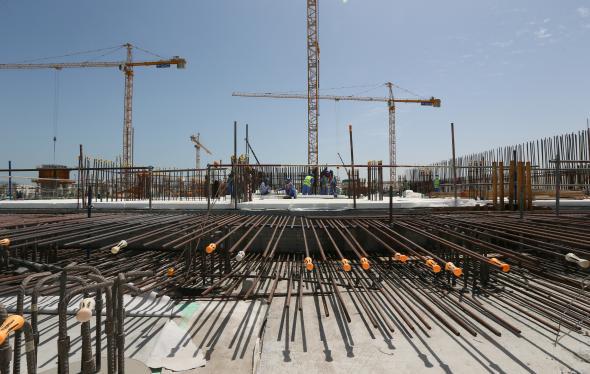Following the new flurry of reporting about the appalling working conditions surrounding the 2022 World Cup in Qatar, summed up well by my colleague Jeremy Stahl last week, the New York Times yesterday published a chilling investigation into the conditions faced by the foreign workers constructing NYU’s new Abu Dhabi campus.
Despite a pledge by the university to ensure the fair treatment of workers, nearly all of the dozens of workers who spoke with the Times reported having to pay recruitment fees of up to a year’s wages, working six- or seven-day weeks in order to pay the fees, having their passports confiscated to prevent them from leaving, and living in squalid 15-men-to-a-room conditions.
Working conditions in the Gulf states—most notably the kafala system of sponsorship-based employment that keeps workers from being able to leave—have been well-documented for years, but elite international educational, artistic, and athletic institutions have been able to maintain something of a blind spot to them.
When internationally renowned architect Zaha Hadid, designer of the largest of Qatar’s World Cup stadiums, was asked to respond to reports that over 382 Nepali migrant workers had died in construction related to the World Cup on top of the more than 500 Indian migrants who have died in the country in 2012, she replied, “I have nothing to do with the workers. I think that’s an issue the government—if there’s a problem—should pick up.”
Most of the large institutions setting up shop in the Gulf probably wouldn’t be quite so callous as to say that working conditions simply aren’t their problem, but it’s nonetheless the case that as the United Arab Emirates and Qatar have given free reign and enormous resources to cultural institutions like NYU, the Louvre, the Guggenheim, and FIFA, and turned themselves into architectural playgrounds for the likes of Hadid, Frank Gehry, Norman Foster, and I.M. Pei. The well-known fact that the Gulf’s construction boom depends on foreign migrant workers enticed by false promises into near-slave labor conditions has often been conveniently brushed to the side.
NYU professor and Gulf labor activist Andrew Ross wrote in 2011*:
If liberal cultural and educational institutions are to operate with any integrity in that environment, they must insist on a change of the rules: abolish the recruitment debt system, pay a living wage, allow workers to change employers at will and legalize the right to collective bargaining. Otherwise, their gulf paymasters will go on cherry-picking from the globalization menu — Lamborghinis, credit default swaps, liberal arts degrees, blockbuster exhibitions — while spurning the social contract that protects basic human rights.
The massive media attention surrounding the World Cup seems to have finally focused some sustained international attention on the issue, and Qatar has to at least promise to reform the kafalasystem. But we shouldn’t also forget the numerous other institutions that have led concerns over the system slide.
Any institution claiming to be shocked by the working conditions in the Gulf has about as much credibility as Sepp Blatter feigning surprise that it gets hot in Doha in the summer.
*Correction, May 20, 2014: This post originally misstated that an Andrew Ross column in the New York Times was written in 2011. It was written in 2014.
